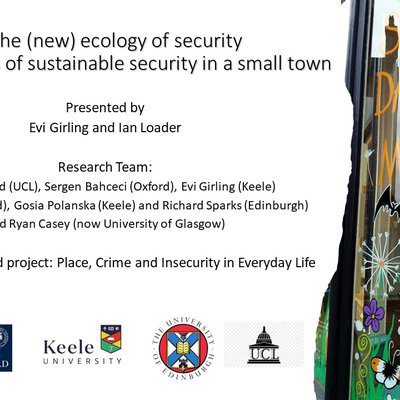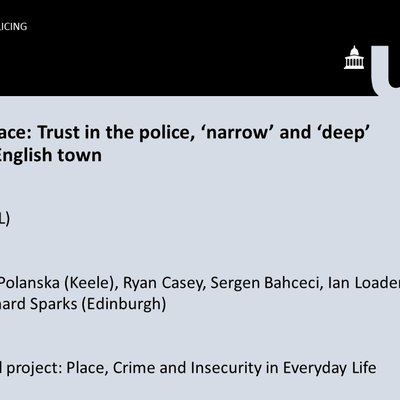Team present two papers at the 2023 Howard League International Conference
The team presented findings from the project in two panels to the Howard League Conference which took place 13–14 September 2022 at Keble College, University of Oxford
Dr Evi Girling discussed everyday environmental troubles and the 'greening' of everyday security concerns and acts of care in a paper called The (new) ecology of security: Tribulations of sustainable security in a small town
Abstract/Summary
Drawing on our current revisiting of an old research site, Macclesfield in Cheshire, this paper reflects on shifts in the local meanings of in/security since the mid-1990s. In revisiting the town, we discover a set of everyday troubles (littering, dog poo, the tribulations of parks and other valued public spaces) that appear to call forth established forms of environmental criminology (the ‘broken windows’ thesis; theories of ‘defensible space’ in urban design). But we have also encountered security concerns that attach themselves to new objects that are often described as environmental (pollution, flooding, and other local indicators of climate crisis). In this paper, we argue that both these ‘new’ and ‘old’ forms of environmental trouble are signs of a greening of security wherein problems such as street-drinking, litter, badly parked cars, flooding etc. matter because they are entangled with people’s sense of the liveability and sustainability of the places in which they strive to make meaningful lives. Discourse about ‘fear’ and ‘crime’ tends to be about moral boundary-drawing, defining place with reference to hostile ‘outsiders’, and defending these places from incursion. The new ecology of security shifts this orientation to protecting place in important respects. One is that concern for place is translated into practices of active caring, wherein questions of vulnerability, precarity, solidarity, resilience, and sustainability come to the fore. The second is greater consciousness of how ‘we’ (the insiders) have come become agents of our own peril - implicated in producing the security problems with which we are concerned.
Professor Ben Bradford presented a paper drawing from data from our survey on sense of place and trust in the police. It was titled Policing and place: Trust in the police, ‘narrow’ and ‘deep’ security in an English town
Abstract/Summary
In this paper we consider the contribution of policing to people’s sense of safety and security. Using data collected from a survey of residents of a mid-sized English town, we consider the extent to which evaluations of police activity and behaviour are associated with (a) a ‘shallow’ sense of security – roughly speaking, feeling ‘safe’ – and (b) a ‘deeper’ sense of security – being comfortable in, and with, one’s environment. Much policy discourse tends to concentrate on the contribution police can make to feelings of safety, narrowly defined. Yet, more expansive accounts stress the extent to which deeper rooted forms of security and belonging might be more important ‘outcomes’ of police activity; outcomes which, moreover, may be occluded or even inhibited by an excessive focus on demonstration of or at least claims to instrumental effectiveness. Our results resonate with these latter accounts. We find no link between perceptions of police effectiveness and subjective (un)safety, although there is an inconsistent association between police effectiveness and worry about crime. Yet, we find a strong association between perceptions of police fairness and people’s sense of attachment to and belonging within their community. By focussing more accurately on the forms of safety and security police can hope to ‘produce’, we open up space for consideration of the ends they seek to achieve as well as the means they seek to use. Yet, translating these ideas to more fraught social and political contexts – and those with higher crime rates – may be a significant challenge
Revised: 12 Mar 2024, 1:24 p.m.

